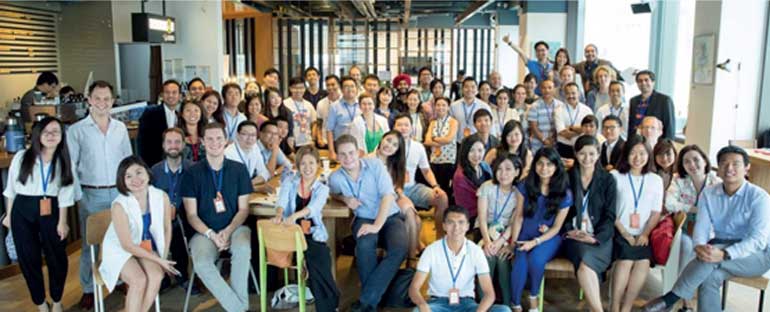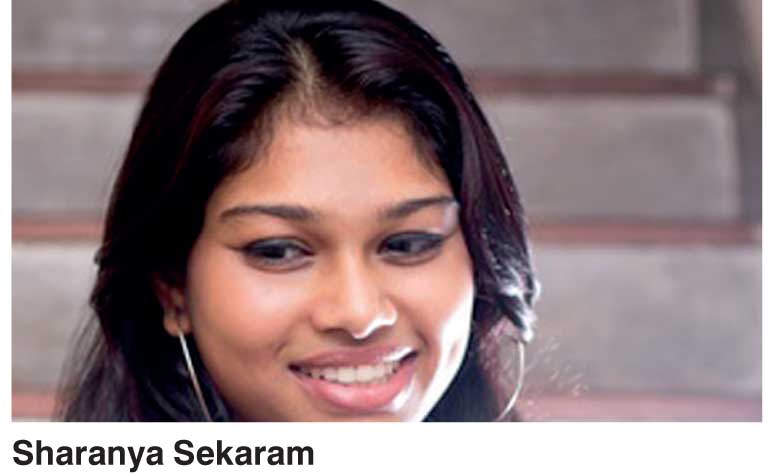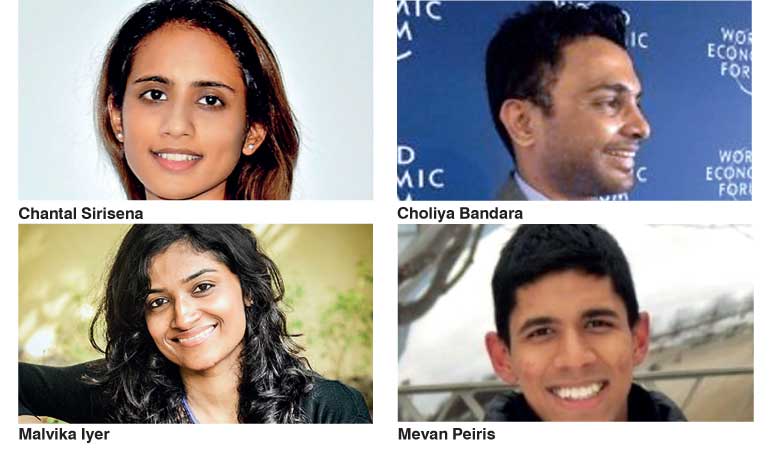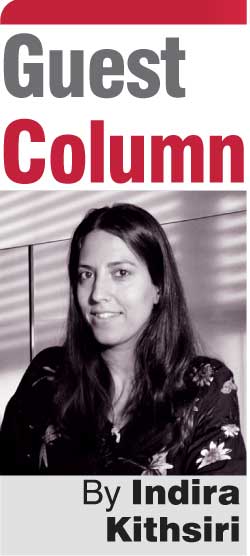Monday Feb 16, 2026
Monday Feb 16, 2026
Monday, 2 October 2017 00:03 - - {{hitsCtrl.values.hits}}

Born out of the World Economic Forum, the Global Shapers Community is a network of inspiring young people between 20-29 years of age working together to address local, regional and global challenges, united by the same desire to bring about change. In South Asia, nearly 600 shapers spread across 36 hubs are developing initiatives ranging from transforming education to empowering youth to combating poverty and building inclusive communities.
Their concerns, actions and impacts
Last month, the World Economic Forum launched the third edition of the world’s most geographically diverse survey of millennials, the Global Shapers Annual Survey 2017. Over 31,000 people aged between 18 and 35 responded, giving insights into their views on society, business, politics, the economy and technology as well as their workplace and career aspirations. If climate change remained the biggest global concern for the third year in a row, South Asian millennials discussed regional issues that most concerned them being the lack of economic opportunity and employment (47,3%), poverty (34,6%), lack of education (33.8%) and inequality (income, discrimination) (31.7%).
South Asia is currently at a crossroads. Over the years to come, prospects for equitable growth will largely depend on the region’s ability to address fundamental issues such as creating jobs, increasing transparency, boosting living standards and shared prosperity. With an increasingly youthful population, there is an unprecedented opportunity for young people to take an active role in shaping the future.
Job creation
Home to 1.7 billion people, South Asia remains the world’s fastest-growing region but also the least integrated one. In today’s world of rapid technological change and increasing competitiveness, South Asian countries need a well-educated, dynamic and skilled workforce to sustain long periods of growth. According to the World Bank, job creation is a key priority on the agenda, given that the region will have to absorb close to one million individuals that will enter the workforce every month for the next three decades.
Equitable growth
It is undeniable that strong growth and resilience have contributed significantly towards reducing poverty in South Asian countries. Notwithstanding this impressive progress, the region remains home to the world’s largest number of poor. Therefore, job creation, investment in education, health and urban development will help boost equitable growth and meet prosperity goals. In light of the above, Shapers from the Dhaka Hub in Bangladesh brought together 150 children from six urban slums and used football as a tool for local development – addressing issues such as education, health awareness and social inclusion. The tournament motivated and delivered important messages to disadvantaged youth between the ages of 10 to 14.


Education
While the region has made tremendous gains in expanding access to schooling over the past decade, poor quality education is still a major impediment to its development and growth according to World Bank. Before all, education needs to be improved at all levels to equip students, teachers and workers with skills relevant for today’s requirements. Conscious of this growing need, the Ahmedabad Hub in India is pushing innovation for education equality by building educational resources for young Indians on subjects not included in standard curricula. Their project ‘Shaping Education’ addresses non-conventional issues, such as gender sensitivity, menstrual taboo, the lack of access to knowledge for the underprivileged, and the lack of awareness of basic citizen rights. ‘Shaping Education’ is creating sustainable community libraries, online do-it-yourself tutorials for educators, and workshops to educate the community about rights and gender issues.
Opportunities for all
“Women and men must be equal partners in managing the challenges our world faces – and in reaping the opportunities. Both voices are critical in ensuring the Fourth Industrial Revolution delivers its promise for society,” said Klaus Schwab, Founder and Executive Chairman of the World Economic Forum. Despite its rapid growth, South Asia has some of the worst human development outcomes, with millions of people lacking access to clean water, sound healthcare, electricity and education. In April 2017, a garbage dump collapse displaced over 250 families in Colombo. In partnership with the Sri Lanka Red Cross, Shapers from the Colombo Hub coordinated a medical camp, which provided first aid and medical treatment to 200 people and distributed relief supplies to survivors.
Amplifying voices of the youth in decision making
50% of the world’s population is under the age of 30. Yet their voices are often excluded from having a say in decisions that will affect them. Representing a new generation of hope, millennials have a strong desire to be a part of the change. As a collective body they must take action to transform existing challenges into opportunities, push boundaries and rethink current systems by exploring new models of growth based on human dimensions, cultural identities and a sense of purpose.
“The positive or negative impacts of decisions made today will either be enjoyed or suffered by the generations of tomorrow. Hence it is highly critical that young people play an active role in decision making processes on issues that would affect them in the future. The Global Shapers community is a proof that the World Economic Forum has fully recognised, accepted and acted upon this fact. Dynamic in their thinking and action oriented, young people need to take on more leadership positions both in the private and public sectors at the international, national and community level,” said Mevan Peiris, Global Shaper, Deputy Curator of the Colombo Hub.
This year, three Shapers from Sri Lanka, namely Chantal Sirisena, Finance Executive at the National Agency for Public Private Partnership, Ministry of Finance, Sharanya Sekaram, Program Manager at the Grassrooted Trust and bakamoono.lk and Choliya Bandara, Business Analyst at MAS Holdings will play an active role in building the India Economic Summit taking place in New Delhi on 4-6 October. They will lead sessions, contribute to the Forum Agenda and brainstorm on new opportunities for collaboration in the region.
Malvika Iyer: A model of grit and resilience
Driven by her passion to inspire others, Malvika Iyer is a Global Shaper, bilateral amputee and bomb blast survivor  who is working on issues related to gender empowerment and giving a voice to differently-abled. Member of the Working Group on Youth and Gender Equality at the UN Inter-Agency Network on Youth Development, she has been invited to Co-Chair the upcoming India Economic Summit among a panel of highly diverse business leaders, policymakers and experts. With this opportunity, she hopes to raise concerns of the youth and bring greater awareness on most pressing issues related to education and inclusion. “I’m a product of inclusion and it’s my dream to see every individual with a disability to be embraced by their society,” she says.
who is working on issues related to gender empowerment and giving a voice to differently-abled. Member of the Working Group on Youth and Gender Equality at the UN Inter-Agency Network on Youth Development, she has been invited to Co-Chair the upcoming India Economic Summit among a panel of highly diverse business leaders, policymakers and experts. With this opportunity, she hopes to raise concerns of the youth and bring greater awareness on most pressing issues related to education and inclusion. “I’m a product of inclusion and it’s my dream to see every individual with a disability to be embraced by their society,” she says.
Living with a disability has never stopped her from bringing positive change and making a difference towards building a more compassionate world. Her firm determination to overcome adversity is a fantastic example of perseverance, courage and positivity. Fighting her own battles, she became a strong advocate for inclusion of disability rights by transforming life challenges into meaningful opportunities, which will undoubtedly inspire many.
Over 700 participants including 50 Global Shapers will participate in the World Economic Forum’s India Economic Summit on 4-6 October 2017 in New Delhi. This year’s meeting under the theme ‘Creating Indian Narratives on Global Challenges’ will convene a truly multistakeholder community to discuss key regional trends and challenges for furthering inclusive development.
The writer is a Community Specialist for India and South Asia at the World Economic Forum, in Geneva, Switzerland. She is currently co-writing a book on innovative Sri Lankan leaders, entrepreneurs and drivers of change to inspire our country’s current and future generations www.iaminspired.lk. Indira has always voiced the importance of society’s investment in youth. Her passion for social enterprise and the mentoring of young entrepreneurs is the crux for her current book project.